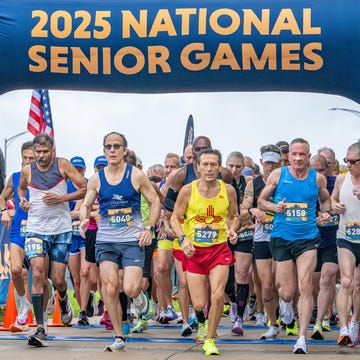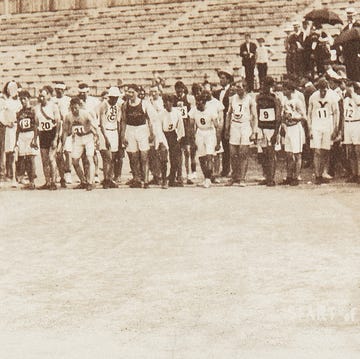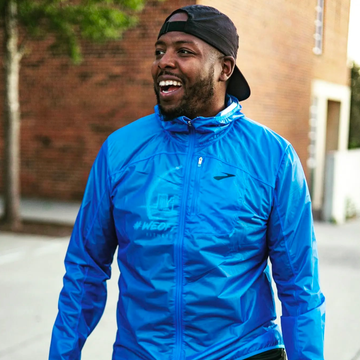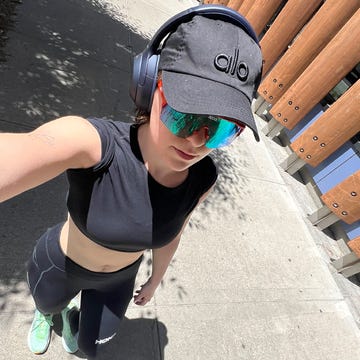In the cold and rainy darkness in February 2021, runners gathered near Isamu Noguchi’s Black Sun, a tire-shaped sculpture on the steps of the Seattle Asian Art Museum. Clad in waterproof jackets, thermal pants, headlamps, and a colorful collection of face masks, the group was ready for a few miles’ jaunt around Volunteer Park.
The Seattle Frontrunners, an LGBTQIA+ running and walking club, met there every Wednesday for camaraderie and exercise—and as an escape from the pandemic’s isolating clutches. To Jake Fedorowski, a newcomer to the area who identifies as nonbinary, it was an experience that would fundamentally change their relationship with running.
While growing up just east of Minneapolis, Fedorowski found community and purpose in theater, which led them to pursue a bachelor’s degree in stage management from Columbia College Chicago. There, Fedorowski started running to stay in shape, striding alongside Lake Michigan blasting upbeat show tunes in their earbuds. After graduation in 2017, while bouncing from city to city for jobs, running remained a solo activity for them, punctuated by the occasional 5K race. It wasn’t until that freezing wet evening in Seattle when Fedorowski discovered that running is more fulfilling when shared with others.
“Within eight months of joining Frontrunners, I went from running 5Ks to running my first marathon,” Fedorowski says. However, joining the group also opened their eyes to a harsh reality: “This inclusive community... isn’t necessarily the norm across the industry or across sport in general. That’s where my advocacy started to kick in.”
Over the next two years, Fedorowski would lead the charge for nonbinary inclusion at marathons around the world. They developed The Guide to Non-Binary Inclusion in Running, the definitive manual for race directors looking to add a separate division for nonbinary runners; compiled a database of every race with a nonbinary division; founded RUNN+, an online community for nonbinary runners; and personally consulted with the Boston and Chicago Marathons to implement nonbinary divisions. Not to mention they also completed three marathons and worked full-time.
“What keeps me going is getting to see nonbinary folks participate in these events within these divisions that allow them to compete as their authentic selves,” Fedorowski says.
Thanks in part to Fedorowski’s work, hundreds of races across the world now have nonbinary divisions, including five of the six world majors: Berlin, Boston, Chicago, London, and New York. The fields are still small—24 nonbinary athletes finished the Boston Marathon this spring—but they’re growing quickly. When Fedorowski completed their first marathon in the nonbinary category—Grandma’s Marathon on June 18, 2022, in Duluth, Minnesota—they were just one of two finishers, in addition to a single participant in the half marathon earlier that day.
That finisher was Sarah Stuhr from Walters, Minnesota. Stuhr, 36, spotted the nonbinary pride flag rippling in the breeze between the heads of other spectators, its yellow, white, purple, and black horizontal stripes tied around the neck of a determined athlete just meters from the finish line: Fedorowski.
Stuhr can’t remember exactly what they cheered—some version of “go, nonbinary athlete!”—but Fedorowski discerned the phrase through the roar of the crowd, raising their hands in the air as they strode across the finishing mat, grinning. “I didn’t think there would be anyone else there that knew what that flag meant,” Fedorowski says.
“It was just so special to see this other person who identifies the same way as me about to cross their own finish line, just knowing that we’re this very small line in the history books somewhere of this race,” Stuhr says.
The two now keep in touch, congratulating each other via text on the occasional personal best or catching up at major marathons. That small connection is exactly what motivates Fedorowski to do this work.
“I didn’t come into running until my 20s. I’m always thinking about what could have been if I’d had that inclusive atmosphere to step into at a younger age,” Fedorowski says. “I want that next kid who’s trying running for the first time to not be pushed out of the sport. I want them to come into a space that accepts them and affirms them.”
Everyday Champions: 2023 RW Runners of the Year

Chris Hatler is the Deputy Editor of Esquire. He previously served as the Senior Editor of Men’s Journal and Features Editor of Popular Mechanics.














